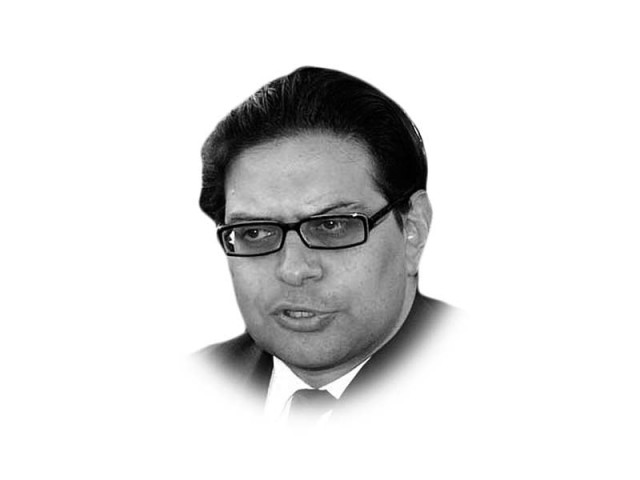Duty to not defer
Many in PM Imran's party seek to succumb to lunacy

The writer is an advocate of the Supreme Court
The judgment could easily have been deferred by a few months for reasons that are considered routine in our judicial system. By then there would be a new Chief Justice to worry about the verdict and its consequences. It would, however, have been an abdication of judicial duty. Aasia Bibi’s appeal was more than ripe for hearing and she had already spent well over eight years in prison. In fixing and deciding Asia Bibi’s appeal now the incumbent Chief Justice Mian Saqib Nisar has displayed that rarest of qualities that are easily claimed but hardly ever realised. The courage to lead and take responsibility at personal physical risk is not something lawyers sign up for when they join the profession. In this Chief Justice Nisar was joined by Justices Asif Khosa and Mazhar Alam Miankhel. Either could have recused himself from the bench. Instead they chose to do their duty to the nation and to the accused. This was not a populist cause. Justice had to be done. It was done.
The case against Aasia Bibi was based on the verbal testimony of three witnesses and a first information report filed five days after the alleged incident. Two of the witnesses were semi-literate sisters with whom Aasia Bibi had taken issue, in the presence of about 20 other farm workers, on their refusal to accept the drink of water offered by her Christian hands. This fact the witnesses suppressed in their depositions. None of the other 20 farm workers came forward to depose about the alleged blasphemy. The third witness was the owner of the field in which the other two witnesses and Aasia Bibi worked. The field owner’s alleged presence at the time of the incident the Supreme Court found unlikely, especially since he was not mentioned in the earliest narration of events. Accounts provided by the three of Aasia Bibi’s alleged extra-judicial confession were at variance about the locale as well as the numbers present at the time. The court found the verbal testimonies internally as well as mutually inconsistent and the first information report a concoction rather than an immediate truthful account of what had happened. This was enough to take the alleged commission of the offence of blasphemy beyond reasonable doubt. An acquittal was the only possible outcome. The review petition will, soon enough, meet its inevitable fate.
There was no clash of principles in this case. The judges make that clear. Only the facts as presented had to be evaluated. However, the nearly decade-long blood soaked reaction in the name of religion to Aasia Bibi’s case has framed the two judgments as demands on our conscience that we must answer as a people. Do we retain the capacity to stand for unpopular facts? Are we willing to fight for the space to question unexamined convictions? Can the weak and the voiceless prevail against the fury of violent mobs through recourse to due process? Why is it that rabble rousing mullahs have found allies in acknowledged religious scholars who have held responsible positions in the service of the state? Why is it that popular religion, subscribed to by a significant segment of our society, has become disconnected from the basic notions of due process on which the modern state is structured? Civilisations crumble in bits and drips as minds close and collapse. The will to stand for reason then finds refuge in opportunistic collusion. That happened last year at Faizabad. Deferring the moment of truth becomes a tactic till there is nothing to defer.
Aasia Bibi’s travail, since her altercation on that dusty farm that produced only hunger and ignorance for her and her accusers, has brought out the best in us and the worst. Prior to the commitment to duty displayed by the three venerable judges of the Supreme Court there were others who refused to cower in fear. Punjab Governor Salman Taseer deemed reaching out in support to Aasia Bibi his duty. Taseer paid with his life. Few were willing to stand up for him. When the time came to determine the date of execution of Governor Taseer’s convicted assassin, then Prime Minister Mian Nawaz Sharif, Taseer’s political foe, could have caused deferral of the execution for years. The President could have been advised to sit on the convict’s mercy petition. Many in his party counselled him to do so fearing an electoral backlash of several thousand votes in each constituency in Punjab. The then Prime Minister chose to do his duty in allowing the consequences prescribed by the law to take effect. This led to the genesis of the Tehrik-e-Labbaik that might have caused Mian Nawaz’s party dearly in the last general election.
Today it is the same Tehrik-e-Labbaik that is leading the challenge to the state in the aftermath of Aasia Bibi’s acquittal. With his inspiring address to the nation hours after the Supreme Court judgment Prime Minister Imran Khan declared his intent to do his duty to the nation in protecting the writ of the state. Many in his party seek to succumb to lunacy. The Pakistan Peoples Party that had gone silent after Governor Salman Taseer’s assassination has now spoken up through Bilawal Bhutto. The PML-N has also indicated its support in countering the enemy within. Is it now too much to expect all power centres in Pakistan to finally accept that religiosity as a political tactic, whether deployed by the powerfully sponsored Defence of Pakistan Council or the Tehrik-e-Labbaik, ultimately leaves behind nothing but the burnt edifice of a delegitimised state.
Published in The Express Tribune, November 4th, 2018.
Like Opinion & Editorial on Facebook, follow @ETOpEd on Twitter to receive all updates on all our daily pieces.















COMMENTS
Comments are moderated and generally will be posted if they are on-topic and not abusive.
For more information, please see our Comments FAQ